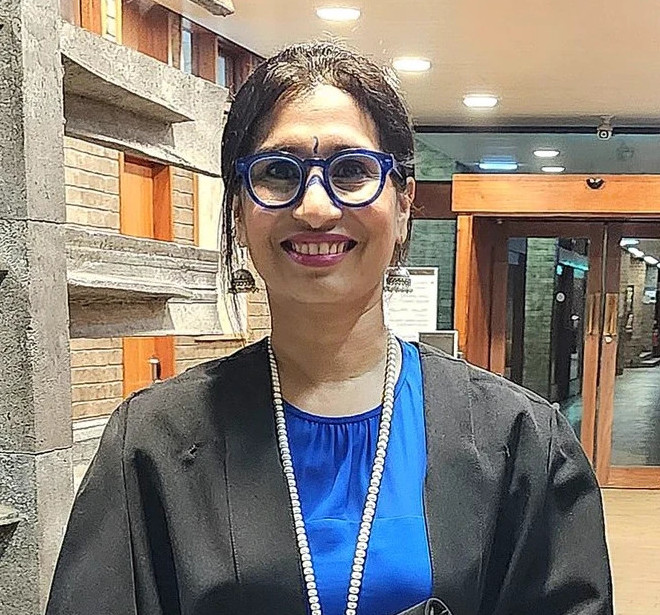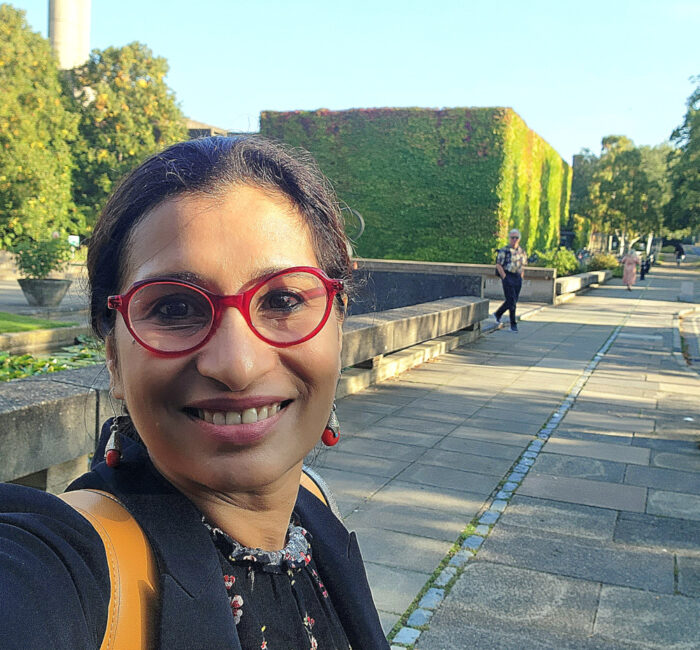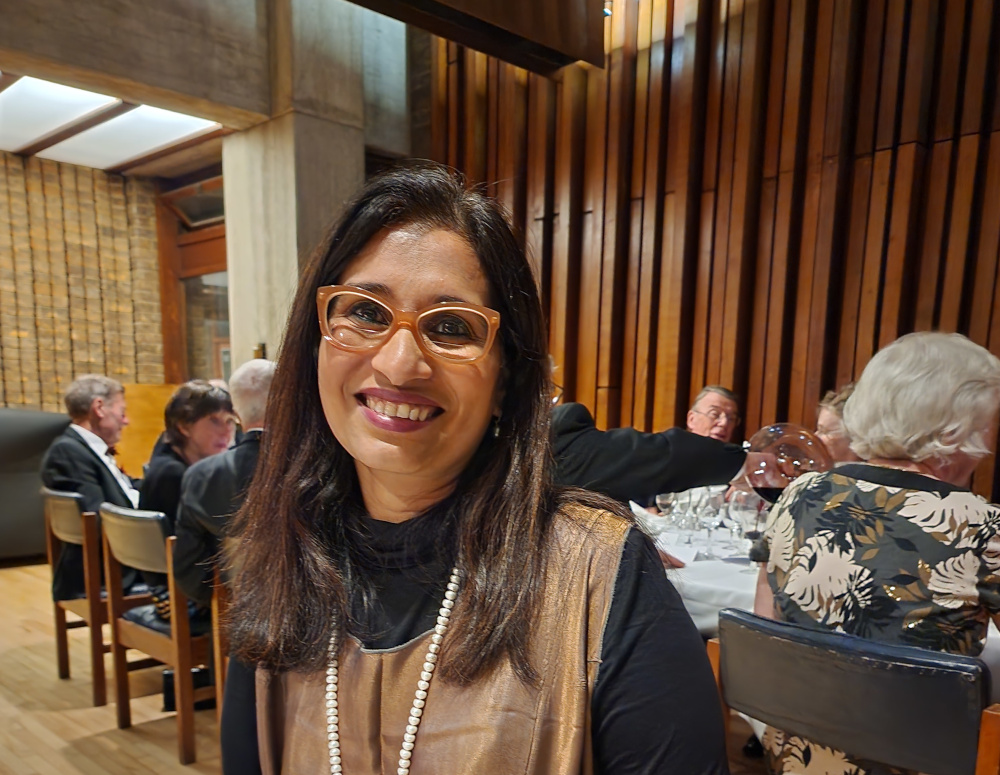At Churchill College we are extremely proud of our Fellowship community. We currently have the third highest number of full Fellows in Collegiate Cambridge and also enjoy a particular emphasis on visiting fellowships, having a scheme of Overseas Fellowships and By-Fellowships which has brought hundreds of distinguished scholars to Cambridge from around the world. In recent years the College has also added a scheme for Postdoctoral By-Fellows, giving access to College life to some of the University’s huge cohort of early career scholars and scientists.
Who makes up our Churchill College Fellowship community, what do they do and why are they so important? Members of our Fellowship come from a wide range of disciplines, cultures and stages in their academic careers. In the first of our profiles celebrating different aspects of the Churchill Fellowship community we met with Professor Bhramar Mukherjee to find out more about Visiting By-Fellowships. Professor Mukherjee joined Churchill as a Visiting By-Fellow in Michaelmas 2022 and returned in August this year. She will be joining the Fellowship as an Overseas Fellow from August 2024.
Visiting By-Fellowships are offered to senior academics from overseas staying for relatively short periods of time (such as one term), younger academics from overseas and visiting scholars from within the UK. Elections are made following nomination by a sponsoring Fellow of the College who intends to collaborate or otherwise has a significant interaction with the nominee.
The college life at Cambridge is truly a unique intellectual experience. I have learned so much about science and humanities from my colleagues at Churchill College by attending high tables and community events. I felt each meal was a class with the fellow I was sitting next to. I learned by osmosis. Whatever I do in the future, these four months will have a strong influence on my thinking.
Professor Bhramar Mukherjee

What was your route to joining Churchill College as a Visiting By-Fellow?
I did a significant amount of public health communications work in India during the pandemic. I was already a big fan of Professor Sir David Spiegelhalter who is an exemplary role model in this area and a fellow at Churchill College. I knew the former director of the MRC Biostatistics Unit, Emeritus Professor Sylvia Richardson and I had discussed a sabbatical in Cambridge before COVID with her, but COVID cemented the topic, the foci and the desire to learn from both Sir David and Sylvia. David was extremely kind to support my fellowship application at Churchill.
What did you get involved in whilst you were here?
There are two major advantages of uprooting yourself from your familiar and too comfortable academic surroundings to a new environment. One is that the conversations with new colleagues shed new light on your existing work but also you get interested in brand new work. I had both. I got a new perspective on my ongoing work from colleagues at the MRC Biostatics Unit (BSU) and I also got involved in unexpected projects, for example with Dr Ramit Debnath and Dr Ronita Bardhan on data needs to show inequity in climate change in impoverished settlements, in particular the gender effect of heat related stress. I also did an interview with Sir David Spiegelhalter and Professor Sylvia Richardson for a journal and the College helped with turning that into a video piece.
What has been the impact of your time here as a Visiting By-Fellow?
I was experiencing pandemic burnout when I went to Churchill. The fellowship rejuvenated me. The high tables and conversations in the Churchill College SCR increased my curiosity and knowledge across disciplines. I work at the University of Michigan – the #1 public University in the US – but we do not have a college system. I do not have too many opportunities to learn about music, linguistics, plant biology, poetry – you name it. I felt each meal was a class with the fellow I was sitting next to. I learned by osmosis. I was living inside the College. It felt like a monastery of scholarship. I made many friends, it felt like graduate school, with white space to draw the next idea.
What did you enjoy most about being part of the Fellowship community?
Absolutely the community. The leadership, the Master, Vice Master, Senior Tutor all took an interest in my fellow’s life. The staff were keen to make you feel at home. I also enjoyed the feasts, the holiday party, and the alumni weekend. I enjoyed the events that featured female scholars organized by Dame Athene, 50 years of women in Churchill, the lightning talks by PhD students.
Why is this type of opportunity so important for the academic community?
Every institution has its tradition, culture, and school of thinking. I think experiencing this intellectual diversity is critical to stay dynamic as a researcher and a human. But at the same time, it is hard to integrate in 4 months when you are already established in your own field. I felt the Churchill Fellowship facilitated that integration in a seamless way. It is really the people in the college who make it so memorable.
What was your most memorable experience?
Wearing my own gown (after I managed to buy one) at a high table was magical. Walking by the College grounds to my unit in the Sheppard Flats and watching scholars write theories on a white board under the open sky seemed like a scene from my idyllic utopian academic world. I also enjoyed talking to the Churchill scholars from the US, including one from Michigan. I was elected to the US National Academy of Medicine in 2022 when I was in Churchill and I received a note from Dame Athene shortly after, which was very surprising and gratifying that I was recognised as a member of fellowship.
What did you like most about the Fellowship and the College?
The radical openness. For example, last fall I saw three prime ministers and two monarchs in Britain. It was a time of change. I could discuss opposing views about monarchy, politics in a civil but passionate way with the fellowship without being afraid of polarized animosity. I liked that.
The grounds of the college are spectacular. I will never forget seeing the daffodils we planted when I left in December back again in May when I visited…they were creating yellow waves on the field. The art on the wall and sculptures on the ground. Whenever I am in Churchill I feel like a pilgrim at a place of worship. The worship is for learning. It made a huge difference in my life. I am living and leading with purpose and priority after my fellowship.
What are your plans for the future?
I decided that whatever else I do, Churchill College has to be part of my academic identity. I applied for an Overseas Fellowship at the College. Thanks to my nominator Sir John Aston and the fellowship selection committee, I will be spending three months in College from 2024, at least till 2026. MRC BSU also offered me an honorary senior visiting fellowship. I am very grateful for this opportunity to get to know the college members as well as the broader statistical community in the UK.

By-Fellows at Churchill College
The College typically has a Fellowship community of around 249 including 24 Honorary Fellows, 7 Benefactor Fellows and 67 By-Fellows. Our By-Fellows represent a diverse range of categories; from Teaching, Postdoctoral and Professional By-Fellowships to Archives, Artist and Visiting By-Fellowships.
Although they are not full Fellows, By-Fellows are strongly encouraged to engage in both the academic and social life of the College and are provided with an allowance for High Table dining as well as attending various guest nights and other special dinners in College. They can also use the facilities of the Senior Combination Room and in the case of Visiting and Archives By-Fellowships, there is also an entitlement to rented accommodation in College, if available.
Read more about the full range of available By-Fellowships available: Fellowships at Churchill College – Churchill College (cam.ac.uk)

